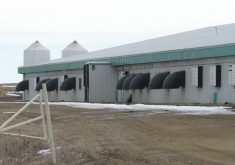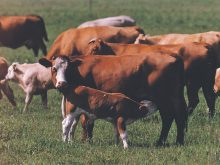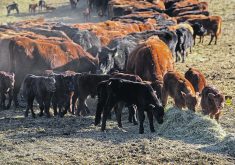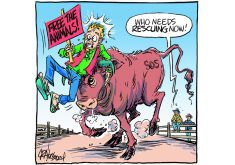There is an increased desire to use natural remedies when treating production animals. For dairy farmers, the driving force behind this approach is the opportunity to market organic milk. Other dairy producers also believe their cows are healthier when raised holistically.
A holistic approach to raising dairy cows means addressing everything that affects the animals. Nutrition and management techniques, including pasture and forage management, are all important because they affect animal well-being.
Old-time farmers recognized the value of spring grass, with its fresh nutrients and minerals. Dairy cows have optimal health and performance when they are fed grass supplemented with grain. Grass, which is high in protein but low in energy, is balanced by energy-dense grains. Chicken feathers and manure or rendered meat byproducts are obviously not natural dietary ingredients.
Read Also

Trump’s trade policies take their toll on Canadian producers
U.S. trade policy as dictated by president Donald Trump is hurting Canadian farmers in a multitude of ways.
In a holistic herd, no herbicides or insecticides are sprayed on the pasture. Instead, the grass is managed with intensive rotational grazing, in which cows are sequentially moved from one pasture to another. Instead of eating harvested forage, cows are allowed to consume it in its natural state. This approach also allows cattle to exercise and be out in the sunlight.
The veterinary needs of holistic herds must be balanced between conventional and natural treatments. Some ailments such as calving problems, broken bones, cut teats, milk fever and grass tetany should be treated the regular way. However, there are many non-critical diseases that can be treated naturally without drugs.
Mastitis is a good example. Regular veterinary practitioners would use antibiotics and recommend continual stripping (milking) of the affected quarter.
The natural practitioner would recommend stripping, but rather than antibiotics, he may suggest homeopathic remedies, which are highly diluted substances. The beneficial effects of homeopathic products come from the energy of the substance rather the substance itself. An appropriate remedy is given many times a day, possibly every half hour. Holistic practitioners claim good success with these types of remedies.
Infertility in cows can be improved with nutritional supplements. One example is Icelandic kelp, which provides 54 vitamins, minerals and micronutrients. While reportedly boosting the general health of dairy cows, it particularly improves reproductive health. Homeopathic remedies are also used to nudge cows into cycling.
Chiropractic adjustments have proven to be beneficial for cows, but this is a gentle procedure done only with hands, not mallets, as it was depicted over the years in large animals. A chiropractic adjustment can help a cow’s digestion, boost milk production and improve fertility.
Acupuncture has been used in cattle, particularly in breeding bulls. It has been shown to boost sperm counts and help arthritis.
Vaccinations, though not considered an alternative therapy, can help prevent the emergence of infectious disease. They can therefore be valuable tools in a holistic herd.
As the shift toward holistic cattle production increases, more veterinarians will train in this area to meet the demand.














